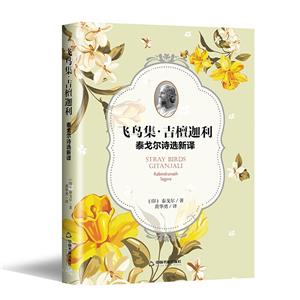有劃線標(biāo)記、光盤等附件不全詳細(xì)品相說(shuō)明>>
-
>
百年孤獨(dú)(2025版)
-
>
易中天“品讀中國(guó)”系列(珍藏版全四冊(cè))
-
>
心歸何處
-
>
(精裝)羅馬三巨頭
-
>
野菊花
-
>
梁?jiǎn)⒊視?shū)
-
>
我的父親母親:民國(guó)大家筆下的父母
飛鳥(niǎo)集·吉檀迦利:泰戈?duì)栐?shī)選新譯 版權(quán)信息
- ISBN:9787506859127
- 條形碼:9787506859127 ; 978-7-5068-5912-7
- 裝幀:一般輕型紙
- 冊(cè)數(shù):暫無(wú)
- 重量:暫無(wú)
- 所屬分類:>
飛鳥(niǎo)集·吉檀迦利:泰戈?duì)栐?shī)選新譯 本書(shū)特色
我的主人,這是我對(duì)你的祈求——請(qǐng)你鏟除,鏟除我心中貧乏的根源。 賜我力量,讓我從容承受歡樂(lè)和悲傷。 賜我力量,讓我的愛(ài)在服務(wù)中豐收。 賜我力量,讓我永不拋棄貧賤也不屈服于強(qiáng)權(quán)。 賜我力量,讓我的心靈超脫日常瑣事。 再賜我力量,讓我的力量滿懷愛(ài)意遵從你的意志。
飛鳥(niǎo)集·吉檀迦利:泰戈?duì)栐?shī)選新譯 內(nèi)容簡(jiǎn)介
若說(shuō)《飛鳥(niǎo)集》是一條溪流,《吉檀迦利》則是一片汪洋。《吉檀迦利》是Gitanjali的音譯,意為獻(xiàn)歌,是獻(xiàn)給神的詩(shī)歌。詩(shī)作大多以I(我)對(duì)Thou(You,你)訴說(shuō)的形式展開(kāi),Thou是God(神),對(duì)于有宗教信仰者,可以把自己所信仰的神代入,對(duì)于沒(méi)有宗教信仰者,可把神當(dāng)作一個(gè)遠(yuǎn)古的智者,一個(gè)睿智的長(zhǎng)輩,一個(gè)知心的朋友,或是心靈深處的另一個(gè)自己,每一首詩(shī)都像靜夜的一次促膝長(zhǎng)談。
飛鳥(niǎo)集·吉檀迦利:泰戈?duì)栐?shī)選新譯 目錄
飛鳥(niǎo)集 001
吉檀迦利 167
飛鳥(niǎo)集·吉檀迦利:泰戈?duì)栐?shī)選新譯 節(jié)選
1 Stray birds of summer come to my window to sing and fly away. And yellow leaves of autumn, which have no songs, flutter and fall there with a sigh. 夏日悠閑的鳥(niǎo)兒來(lái)到我的窗前,唱著歌,又飛走了。 而秋天的黃葉沒(méi)有歌唱,嘆息一聲,飄落在那里。 2 O Troupe of little vagrants of the world, leave your footprints in my words. 那一小隊(duì)浪跡天涯的賣藝人,請(qǐng)把你們的足跡,留在我的詩(shī)文里。 3 The world puts off its mask of vastness to its lover. It becomes small as one song, as one kiss of the eternal. 世界對(duì)著它的愛(ài)人揭下浩瀚的面紗。 它變得微小,如一曲輕歌,如一個(gè)永恒之吻。 4 It is the tears of the earth that keep her smiles in bloom. 是大地的淚水,使她的笑顏綻放。 5 The mighty desert is burning for the love of a blade of grass who shakes her head and laughs and flies away. 大漠如火,熱戀草葉,芳草搖頭,一笑而去。 6 If you shed tears when you miss the sun, you also miss the stars. 如果你因?yàn)殄e(cuò)失太陽(yáng)而垂淚,你亦將錯(cuò)過(guò)星辰。 7 The sands in your way beg for your song and your movement, dancing water. Will you carry the burden of their lameness? 歡舞的流水,你途中的泥沙乞求你的歌唱、你的律動(dòng)。 你愿背負(fù)這殘缺的累贅前行嗎? 8 Her wishful face haunts my dreams like the rain at night. 她熱切的容顏,如夜雨縈繞我的夢(mèng)魂。 9 Once we dreamt that we were strangers. We wake up to find that we were dear to each other. 曾經(jīng)夢(mèng)見(jiàn)我們形同陌路。 醒來(lái)方覺(jué)我們彼此相依。 10 Sorrow is hushed into peace in my heart like the evening among the silent trees. 憂傷平復(fù)于我心,如夜幕消融于幽林。 11 Some unseen fingers, like an idle breeze, are playing upon my heart the music of the ripples. 無(wú)形之手,忽如輕風(fēng),撥我心弦,泛起漣漪。 12 “What language is thine, O sea?” “The language of eternal question.” “What language is thy answer, O sky?” “The language of eternal silence.” “大海,你有何言?” “永恒的追問(wèn)。” “蒼天,你以何答?” “亙古的沉默。” 13 Listen, my heart, to the whispers of the world with which it makes love to you. 我的心,聽(tīng)那世界的呢喃,那是對(duì)你的示愛(ài)。 14 The mystery of creation is like the darkness of night—it is great. Delusions of knowledge are like the fog of the morning. 造物之玄妙,如暗夜之恢弘。格物之虛幻,如晨霧之縹緲。 15 Do not seat your love upon a precipice because it is high. 勿因仰慕峭壁之高,便以愛(ài)情攀附其上。 16 I sit at my window this morning where the world like a passer-by stops for a moment, nods to me and goes. 清晨我坐在窗前,世界像一個(gè)過(guò)客,停下腳步朝我點(diǎn)點(diǎn)頭,便離去了。 17 These little thoughts are the rustle of leaves; they have their whisper of joy in my mind. 這些細(xì)微的思緒如樹(shù)葉的窸窣,在我心中歡快地私語(yǔ)。 18 What you are you do not see, what you see is your shadow. 真我不可見(jiàn),所見(jiàn)乃幻影。 19 My wishes are fools, they shout across thy song, my Master. Let me but listen. 主啊,我的祈求如此愚妄,喧囂著擾亂你的圣歌。 讓我只是聆聽(tīng)。 20 I cannot choose the best. The best chooses me. 我不能選擇*好的。 而是*好的選擇我。
飛鳥(niǎo)集·吉檀迦利:泰戈?duì)栐?shī)選新譯 作者簡(jiǎn)介
拉賓德拉納特??泰戈?duì)枺≧abindranathTagore)(1861年5月7日—1941年8月7日),印度詩(shī)人、文學(xué)家、哲學(xué)家和社會(huì)活動(dòng)家,1913年以《吉檀迦利》成為亞洲首位諾貝爾文學(xué)獎(jiǎng)得主,是享譽(yù)世界的文學(xué)大師。他精通文學(xué)、音樂(lè)和繪畫(huà),一生著述頗豐,涵蓋小說(shuō)、劇本、詩(shī)歌、政論等,尤以詩(shī)歌成就非常高,被尊為“詩(shī)圣”,代表作有《吉檀迦利》《飛鳥(niǎo)集》《新月集》《園丁集》等。 黃華勇,1984年生于湖南郴州,2008年畢業(yè)于南開(kāi)大學(xué)商學(xué)院人力資源管理系,從事企業(yè)管理,先后在天津、廈門、佛山、北京等地工作,現(xiàn)居湖南。自幼酷愛(ài)讀書(shū),大學(xué)期間以“仗劍書(shū)生”(ID:huayong)為名在“我愛(ài)南開(kāi)”BBS發(fā)表書(shū)評(píng)、散文、詩(shī)歌20余萬(wàn)字,獲評(píng)優(yōu)秀原創(chuàng)寫(xiě)手。2015年12月開(kāi)始譯泰戈?duì)栕髌罚g筆靈動(dòng)、簡(jiǎn)潔、優(yōu)雅。
- >
我與地壇
- >
史學(xué)評(píng)論
- >
人文閱讀與收藏·良友文學(xué)叢書(shū):一天的工作
- >
莉莉和章魚(yú)
- >
中國(guó)人在烏蘇里邊疆區(qū):歷史與人類學(xué)概述
- >
羅庸西南聯(lián)大授課錄
- >
中國(guó)歷史的瞬間
- >
有舍有得是人生















